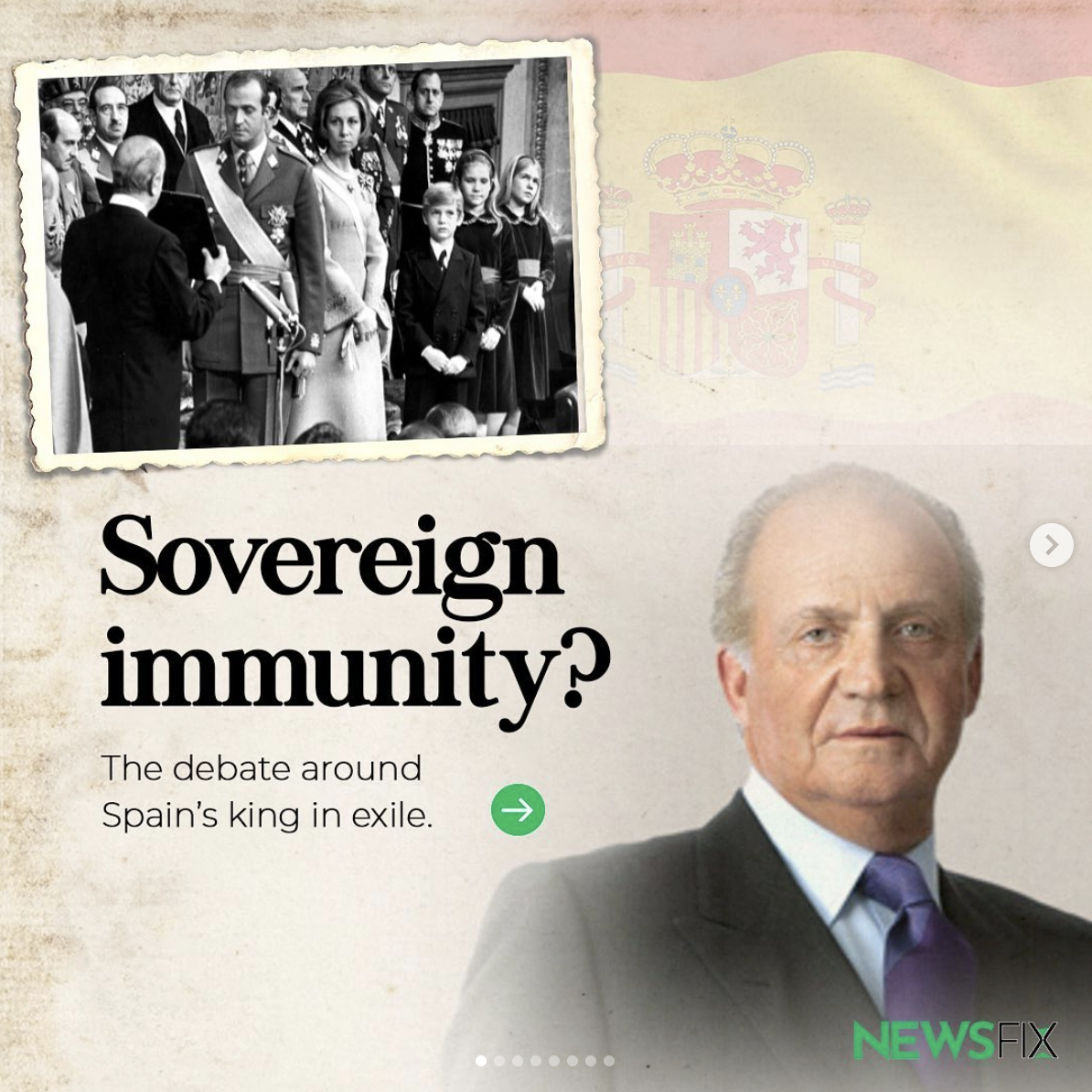🇪🇸 Juan Carlos: A King in Exile
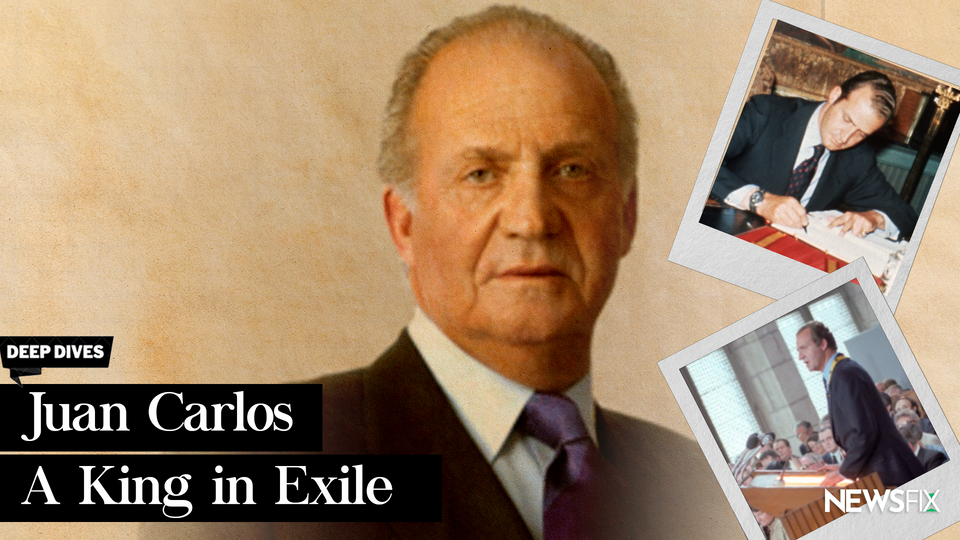
Morning all,
Spain's prime minister saying on Monday he believes the idea of sovereign immunity is outdated and unnecessary came at a most interesting time for the country.
Why? Well, the country's former king, Juan Carlos, lives in exile at the moment - marred by multiple accusations of corruption.
At times it feels as though his legacy is split among generational lines. To many, he is responsible for bringing democracy to Spain post Franco, to others he tainted his own legacy and represents an out-of-touch elite.
Until Monday,
Your Fixers
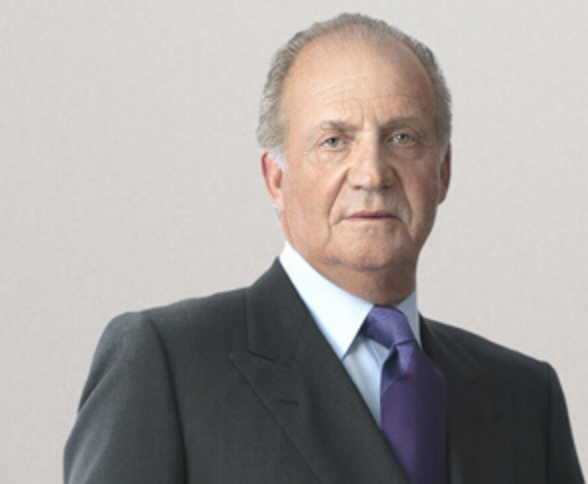
WHO IS JUAN CARLOS?
Born in 1938, Juan Carlos was the grandson of King Alfonso XIII (13th) - another Spanish king who spent time in exile. Juan Carlos spent the first ten years of his life living in Italy, before returning to Spain to be educated.
In 1969 at the age of 32, Spanish dictator Francisco Franco designated Prince Juan Carlos as his successor. Franco believed Juan Carlos would carry on his rule, but to the surprise of many he paved the way for democratic elections within two years of Franco's death.
OKAY, QUICK REWIND?
Throughout history, the Spanish monarchy has had a bumpy ride - taking several breaks, as Spain's political climate shifted between pro and anti-monarchy stances.
Juan Carlos is from the House of Borbón, a family of French origin who ascended to the Spanish throne in 1700.
OKAY, FAST FORWARD
The Wall Street crash in 1929 crippled Spain’s economy - leading to the downfall of dictator General Miguel Primo de Rivera in 1930.
King Alfonso XIII - Juan Carlos' grandfather - had supported the dictatorial regime and left Spain in 1931, dying ten years later in exile in Rome.
The Pact of San Sebastián was signed by the Republicans to overthrow the monarchy, and the Second Spanish Republic was Proclaimed in 1931.
After some years of right-wing government, a left-leaning coalition won parliamentary elections in 1936. In response, a group of right-wing military leaders - led by General Francisco Franco - staged a coup.
They were only able to capture part of the country and a three-year-long civil war followed - leaving more than 350,000 Spaniards dead.
FRANCO IN POWER
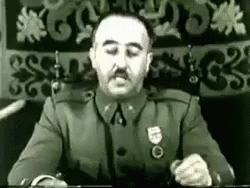
Franco and the Nationalists eventually won the civil war in 1939, and he ruled the country until his death in 1975.
Franco resided over a government that was effectively a military dictatorship, right-wing and authoritarian.
He provided for the continuity of his government after his death through an official law in 1947, which abolished the republic and made the Spanish state a monarchy.
Franco overlooked Juan Carlos' father - widely named 'Don Juan' - instead picking his son as his heir, believing Don Juan would favour a constitutional monarchy.
Franco died in 1975.
To the surprise of many, soon after King Juan Carlos began his tenure as head of state, he distanced himself from the Franco dictatorship and began to shift Spain towards democracy and a constitutional monarchy. This was in defiance of pressure from the military - which generally favoured more authoritarian rule.
In 1977, Spain held its first free elections in four decades - and Ex-Francoist Adolfo Suárez's Union of the Democratic Centre managed a relatively smooth transition to stable democracy.
SMOOTH SAILING, THEN?
Well, one of the most significant and perilous moments in Juan Carlos' reign came in 1981. An attempted coup led by paramilitary civil guards tried to overthrow the government.
In an iconic moment, Juan Carlos went on live TV in military uniform, and called upon armed forces to take "all necessary measures" to crush the revolt. The coup ultimately ended in surrender.
"The crown, a symbol of permanence and unity of the homeland, cannot in any way tolerate acts or attitudes of individuals that aim to interrupt the democratic process." - King Juan Carlos
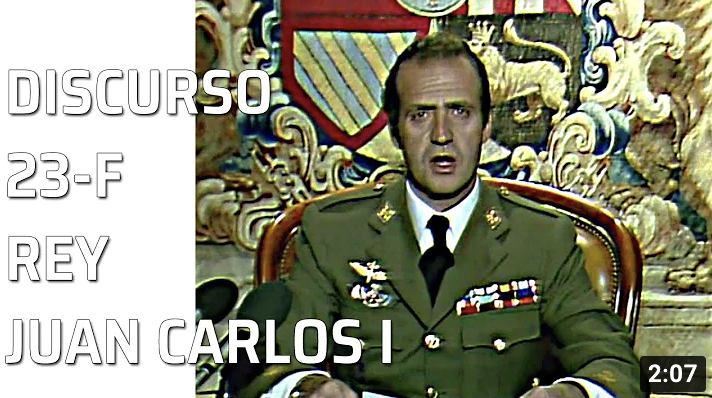
While he undoubtedly played a pivotal role in establishing democracy in Spain, Juan Carlos was not invited to celebrations marking the 40th anniversary of elections in 2017.
At the time, he responded to the snub by saying "the driver of the transition truck has been excluded".
Why was he excluded? Complicating his legacy, in recent years Juan Carlos has been marred by numerous scandals, reported extramarital affairs, and allegations of corruption.
He has been the subject of so many extraordinary headlines over the years.
This week alone, The Times reported an allegation Juan Carlos was injected "with female hormones" by Spain's secret service because his sex drive "was a danger to the state".
SCANDALS AND CORRUPTION
"His once-soaring approval ratings had plummeted in the latter years of his reign following media coverage of hunting expeditions, sentimental relationships and the Nóos case, putting the very survival of the Spanish monarchy in doubt.” - El País newspaper
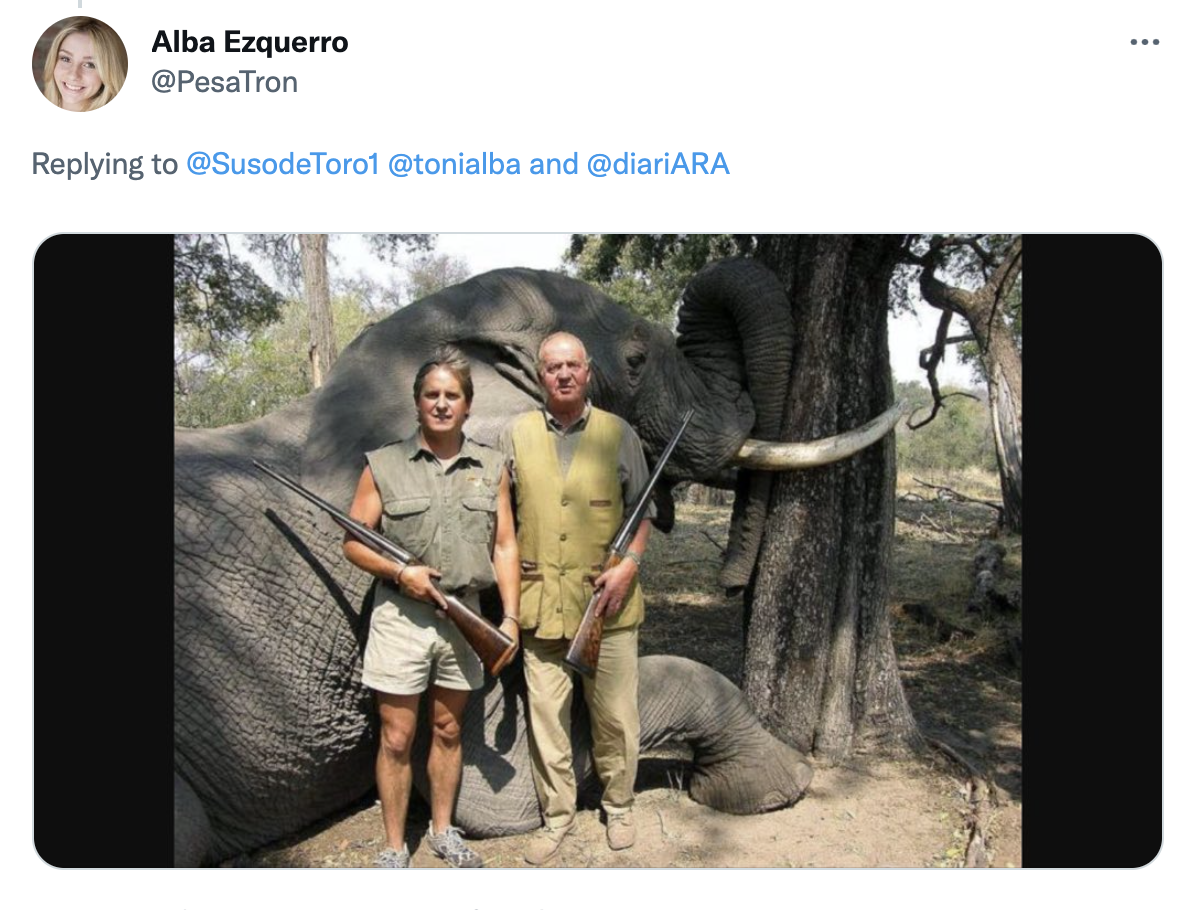
Most people point to a 2012 trip to the time where Juan Carlos' popularity took a serious dive. During a secret elephant hunting trip in Botswana, he broke his hip and had to be flown back to Spain for surgery.
News of the trip - in the midst of Spain's financial crisis - angered many, forcing Juan Carlos to make an embarrassing public apology.
To make matters even worse, Juan Carlos was the honorary president of the Spanish WWF at the time. They sacked him.
Within two years of this scandal, Juan Carlos announced he would abdicate. His son, King Felipe, is the country's current monarch.
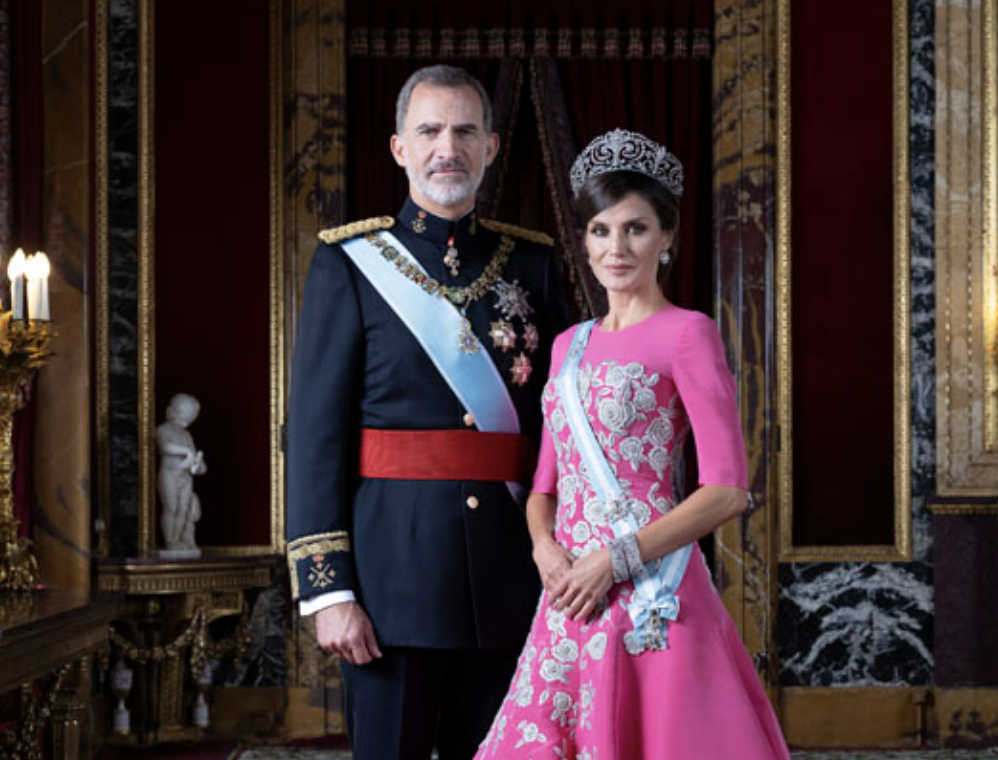
FINANCIAL DEALINGS
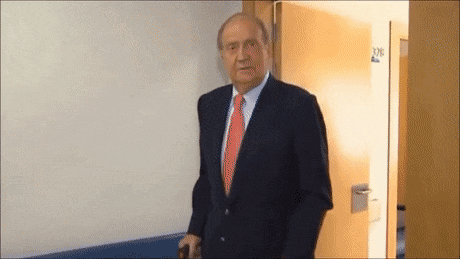
Abdicating did not put an end to interest in Juan Carlos' murky financial dealings.
There is a lengthy and complex list of allegations, including money laundering and tax evasion.
Undoubtedly, one of the most damning allegations against him is that he allegedly received $100 million from the Saudi royal family. He was also accused of trying to withdraw €10 million from a Jersey bank account.
In June 2020, it was announced that Spain’s Supreme Court prosecutor had launched an investigation into the former king, for the part he played in the deal with Saudi Arabia.
A Spanish consortium had landed a €6.7bn (£5.9bn) contract to build a high-speed rail line in Saudi Arabia. However, reports emerged in March 2020 which suggested Juan Carlos had received the $100m payment from the King of Saudi Arabia in 2008 - three years before the contract was awarded.
In order to receive this payment, the King was accused of setting up an elaborate financial structure to conceal the money. According to the Daily Telegraph, the offshore account, named as the Lucum Foundation, was set up in July 2008 in Panama City.
For the first time the current monarchy found itself criticised in relation to the antics of the former king. The royal family reacted by trying to put distance between Juan Carlos and Felipe.
The revelations led to his son, King Felipe VI, stripping his father of his annual stipend. In addition, King Felipe has given up all inheritance that could be tied to any unlawful funds.
In August of 2020, it was announced Juan Carlos had left Spain and gone into exile. He said he left because of the “public repercussions of certain past developments of my private life.” It was later discovered he had moved to the UAE.
In October of last year, an opinion poll found that 40.9% of Spain’s public favour a republic, while 34.9% favour a monarchy.
Last December, the former king’s lawyer stated that he had made a voluntary tax payment of 678,000 (euros) - in an effort to close an investigation into his finances.
Political support: the royal family retains support from most mainstream political parties. That is, except for Podemos - a left-wing party in Spain’s coalition government. Though it is worth noting, Podemos is one of the less influential political parties and a junior in the coalition.
WHAT'S THE LATEST?
According to recent media reports, Spanish prosecutors are expected to shelve the ongoing investigations into Juan Carlos.
What's particularly interesting about this is it is not because prosecutors have concluded Juan Carlos is innocent of the allegations against him.
Instead, they are said to be finding “too many obstacles in their way to fully investigate them”.
The most significant of these obstacles is the fact that, as former sovereign, Juan Carlos enjoys immunity from prosecution on any accusation during his reign.
It is also believed that the former king is now eyeing a return to Spain.
As mentioned, earlier this week Spanish Prime Minister Pedro Sanchez reignited debate on sovereign immunity - stating it was “outdated” and “unnecessary”.
He believes sovereign immunity is a “product of another era... not something for a consolidated democracy with more than 40 years of history”.
Enjoy this piece? Help us spread the word by sharing our summary on Instagram. Thank you in advance, and have a lovely weekend!
